While I don’t think Alex Garland’s directorial debut, Ex Machina, is quite a masterpiece (others have thought so), I do find it an impressive, compelling, thought-provoking film. I’m not at all surprised that Garland’s first film is a success. After all, he wrote two Danny Boyle films — 28 Days Later… (2002) and Sunshine (2007) — and it’s reasonable that he learned a few things along the way. That’s not to say he’s quite in the Danny Boyle league, but he’s certainly a gifted filmmaker. For that matter, his direction doesn’t even especially resemble Boyle’s. Garland — at least here — is more distanced, more cerebral, less inclined toward visual panache for its own sake. I draw the line at calling Ex Machina Kubrickian, though the film’s pacing and its glossy, impersonal settings have a Kubrick feeling — up to a point. And that point is extremely different.
Calling Ex Machina science fiction is certainly accurate, but it may also be misleading. Yes, the trappings qualify, and the whole idea of this artificial-intelligence-endowed robot woman, Ava (Alicia Vikander, Anna Karenina), certainly is sci-fi. But the film overall is as much a psychological thriller as anything else — and maybe more so. The premise involves billionaire computer genius Nathan (Oscar Isaac) inviting an employee, Caleb (Domhnall Gleeson), to stay for a week at his reclusive compound in Norway. The point to this is to have Caleb interact with Ava as a Turing Test — to determine whether or not this creation is actually capable of original thought. In other words, Nathan wants to determine just exactly how “real” — or how human — Ava is.
Conceptually, it’s not entirely unlike good old Dr. Moreau (Charles Laughton) in Island of Lost Souls (1932) wanting to prove whether or not his artificially created panther woman (Kathleen Burke) is a “real woman” — the difference being that his creation was at least organic. This is more like trying to prove the humanity of the robot Maria (Brigitte Helm) in Metropolis (1927) — something probably not lost on Garland, since his Ava is the sexiest robot since Maria and is really something of a modernized take on her. The big departure here is that Ava’s self-awareness is at the heart of the experiment. Nathan views the possibility of her ability to think as a major event for mankind. Caleb views it as more in the realm of God — an idea that Nathan happily twists into Caleb having called him a god. (No amount of protestation on Caleb’s part can shake Nathan’s self-mythologizing here.)
Much of what follows is designed to seem predictable. All the expected notes are hit — including, of course, Caleb’s attraction to Ava — but none of them are ultimately quite what they seem. It would be a disservice to both viewer and film to say much more about the specifics here. It is safe to say, however, that the film toys with the very idea of what it means to be human — something brought forcefully home in a scene where Caleb has a kind of freak-out and thinks that maybe he’s a robot himself. This is certainly headier stuff than the space operas we normally get as science fiction.
Though I likened Ex Machina to Kubrick, it almost might be an Ingmar Bergman chamber drama — only in sci-fi terms. Take away a helicopter pilot and the first scene where Caleb wins the prize of his week with Nathan and the film only has four characters — Nathan, Caleb, Ava and Nathan’s mute servant Kyoko (Sonoya Mizuno) — isolated from the rest of the world, trapped in a psychological drama. That’s about as Bergman as you can get. OK, so it’s finally a little more lively than most Bergman — and certainly not drenched in his Lutheran guilt — but it’s ultimately just as chilling as the bleakest of his works. And yet, Ex Machina is its own beast. Maybe there’s some Boyle, Kubrick and Bergman here, but it’s also very much Alex Garland’s vision. It’s the kind of film that seems to me shy of a masterpiece right now, but one where I may well find it to be with time and repeat viewings. Rated R for graphic nudity, language, sexual references and some violence.



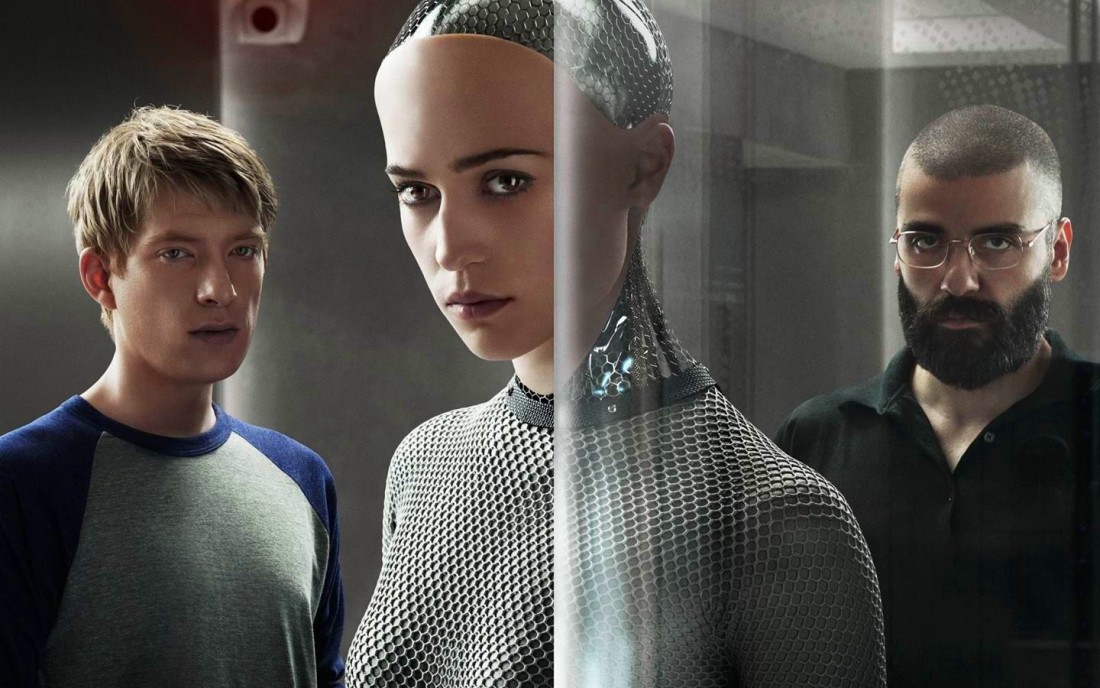
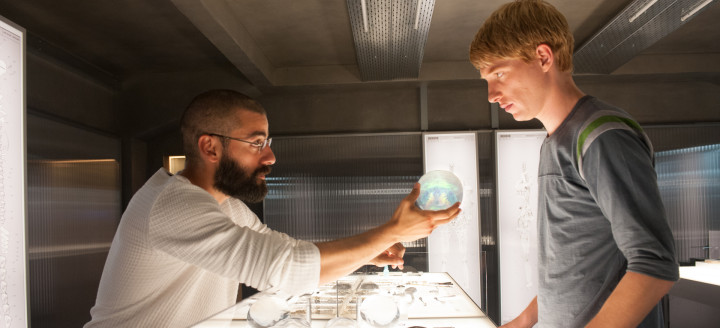
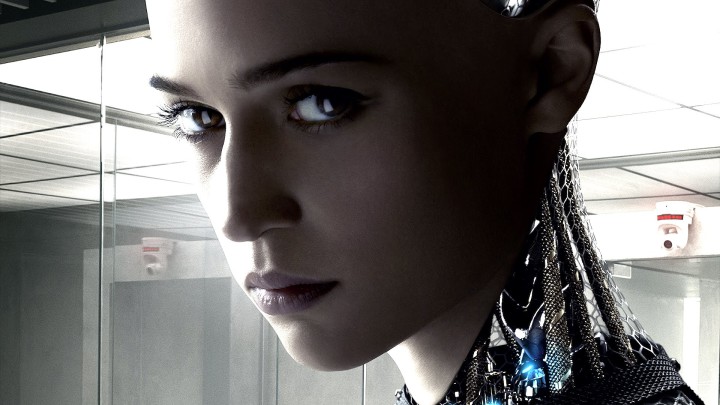
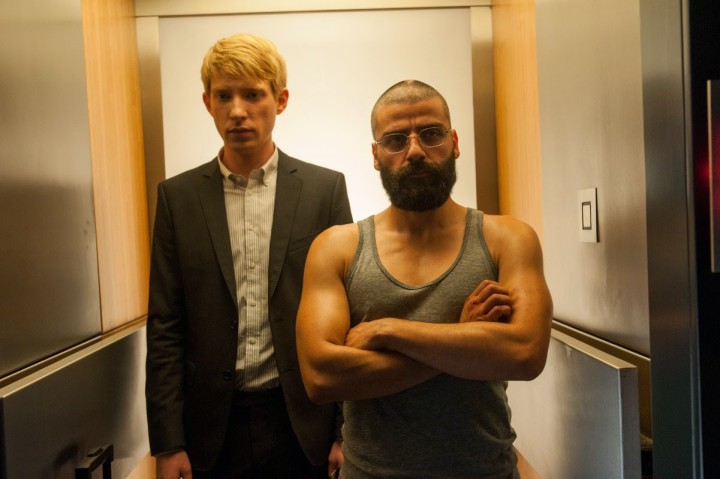
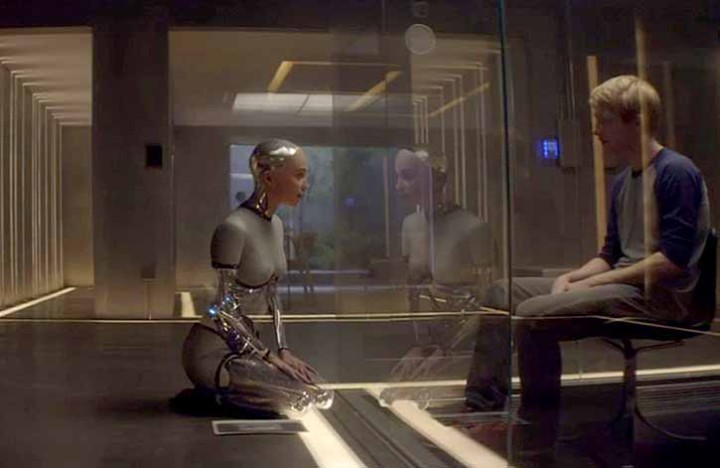
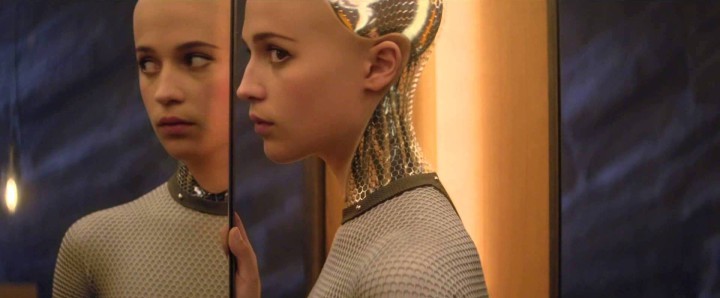
You were right I did like it, one of my favorites so far this year. I liked it much better than Her, which I thought was overrated.
Great snakes, Chris, we’re in agreement on two things in one day. This must stop!
What was the other thing we both don’t like David Gordon Green?
That this is excellent and that Her was overrated. You can throw in Mr. Green (please!), but I think that was at least yesterday.
I’m not yet two days away from, and I’d love to see it again, but for now I’m definitely in the Modern Masterpiece camp.
Just don’t call it an “instant classic,” unless you want a good slapping.
I’ll try to resist the urge. Have you gone back for seconds yet?
No, and there’s a strong chance that that won’t happen in the present circumstances, which is to say that my somewhat diminished levels of energy, my seemingly endless string of Things That Need Doing, and the limitations of traveling with oxygen have put a crimp in my multiple theatrical screenings.
It was outstanding and will probably be in my top ten list this year. Ten minutes in I thought I nailed the twist and even though I was wrong they did approach the topic. A great Gotcha moment. It was a film that had a perfect ending before the ending that they should have gone with but that is a minuscule complaint. Loved it but they missed a golden opportunity casting wise…..Anthony Michael Hall as the boss and Kelly Lebroch as Ava. (Pa-dum-ching)
I hesitate to ask what this ending is they “should have gone with,” but I’m going to. Wasn’t there something else recently that you had gripes with the ending of?
And if you insist on being thoroughly mired in the ’80s, you might note that it’s LeBrock. (And when last seen appeared to be a monument to plastic surgery and Botox.)
Okay SPOILERS AFOOT PEOPLE……….when Gleason realizes she locked him in after the “knife business” there is a medium shot of her going to the elevator and the door slides shut. Perfect time to slap on the credits, the tension of the scene and the music really helps that notion. The actual ending is fine since she’s doing the first thing she said she would do. Not a big gripe at all…..END SPOILER……………………The more I think about this film the more I love it. An island of tranquility in a polluted sea of comic books and remakes.
Sorry about the Wierd Science reference but the “lets make a girl” joke was irresistible.
As before, I disagree with you wanting to truncate the ending.
You coulda made the same joke with Bride of Frankenstein — on which Weird Science leans heavily.
I am a fan of “mind fuck” endings.
That’s what it has now — an ending almost worthy of A Clockwork Orange in its chilling hint of what might follow. What you want is Ambiguity 101.
By the way, if you’re going to say “fuck” let me know, ‘cuz it’ll get stuck in our Glorious Profanity Filter till someone approves it.
I do like how it ended, I just think it would have been quite a strong punch to stop right when she got in the elevator.
And I think it would have been trite and a cliche.